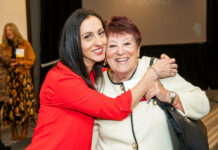
After a decade away, Michael Balaban returned to his roots in June for his new position as President and CEO of the Jewish Federation of Greater Philadelphia. Now that he’s had a couple months to get up to speed, Balaban sat down with The Jewish Exponent to discuss the challenges and opportunities for the Philadelphia Jewish community, how it differs from a Florida Federation where he served in the same position since 2016, what COVID showed about the local community and more.
Jewish Exponent: What are some of the challenges you’ve found since you came on?
Michael Balaban: From a worldwide challenge, there are three core areas that keep me up at night — and likely keep many in the Jewish world up at night:
First, the rise of antisemitism. No matter what direction you turn, it seems to be approaching us, whether it’s from domestic issues to global issues. It raises the question of, will we be safe as Jews, especially in a land that we thought we were pretty secure in? I would encapsulate with that the anti-Zionism, anti-Israel and anti-Jewish [sentiment] that has boiled up over the most recent years. I think we all knew it was under the surface. Now it’s attacking us in broad daylight in all sorts of places in the world.
Second, Jewish Federation’s purpose is to care for the needs of the Jewish people and work to build a more vibrant Jewish future. In caring for the needs, there’s greater disparity for the vulnerable out there today. And COVID has exacerbated this, whether it’s aging populations, frail Holocaust survivors, individuals with disabilities or individuals who are financially insecure. We’ve seen an explosion of need transpire over the course of the past 18 months.
Third, it’s really the question — and maybe it’s because of the age that I’m at, will my grandchildren be Jewish? And what does that look like? I worry about the state of Jewish vibrancy — how do we engage more of our youth, the next generation, to desire to join in rather than opt out? How do we ensure, in a world where denominationalism has dissipated, in a world where we’re seeing far more interfaith marriages going on, how do we embrace as opposed to judge and project?
JE: And how do you plan to address all that?
MB: It starts with a business plan. I don’t know of a successful business that operates by luck, or without a plan. We’re a legacy institution, and like many legacy institutions, you get caught up in this trap of thinking we’ve been here forever, we’ll continue to be here forever. But the world continues to rotate on its axis. That means we need to keep evolving and changing. At some point, we stopped evolving, we’re still utilizing the age-old model for philanthropy that we were founded under. Yes, we made tweaks along the decades, but it is time for a major change of how we do business. We’re looking at all of our strategic core operating elements in order to retool.
The basic elements are to move from a sales model to a service model. To elaborate, we typically pick up the phone and ask a person the following: “Last year you gave X, will you renew your gift to the community and give Y?” That was a model that worked for 100 years. We need to view our customer, the donor, as a philanthropic investor. Investors look for a return, our job, our service, is to provide the best solutions and opportunities for their philanthropic investment to make the most impact in the Jewish world.
JE: What’s your timeline?
MB: I am really excited that Mark Fishman and Ben Kirschner are chairing the strategic plan for us. I anticipate being done with the plan in six months, but the implementation is where the rubber meets the road. My goal is for us to have some quick wins for the community, but for transformative change to take root, it will take time.
JE: What was your impression of the Jewish Federation when you came aboard?
MB: While I may be a recent returnee to Philadelphia, I’ve been in the Jewish Federation and nonprofit world now for well over 30 years. There’s a saying, where you stand depends on where you sit. When I last worked in Philadelphia, I was a Director of Development for Penn Medicine, so my vantage point on the Jewish community was very different. I’m trying not to come into this role with a preconceived notion. Right now it is about listening. I want to make sure that as I’m making decisions and retooling the organization, it addresses Philadelphia’s specific and unique needs.
JE: How would you characterize the Philadelphia Jewish community?
MB: There’s a uniqueness about Philadelphia. There are some similarities to Broward County, Florida, where I came from. The Greater Fort Lauderdale area was nestled between Miami and Boca, two deeply rooted Jewish communities that were seen as mega producers.
Here we’re situated between New York and Washington D.C., and it can cause one at times to look to our left or to our right, or up the coast or down, as opposed to taking a look inward at who we are and what we can accomplish. We found in Florida that once we stopped trying to compare ourselves to the others around us and started diving into who we could be, we grew and were able to really create excitement, create a lot of wins for ourselves and ultimately had those other two communities chasing us instead of us chasing them. There’s something about the psyche here that is a little similar to that.
JE: And how is the Jewish Federation of Philadelphia different than the Federation in Broward County?
MB: There’s much more deep-seated legacy here than was there, because no one’s from Broward County, Florida. Everyone I dealt with, for the most part, was a transplant. But you’ve got diehard Philadelphians here, and there are things that are rooted in the nature and culture of this community that Florida just didn’t have. And that’s a good thing — that’s a great thing — in many respects. However, sometimes you have to let go of ghosts of the past in order to rebuild your future. The pursuit of perfection can impede improvement, and sometimes the ghosts of the past also impede. So we’ve got to make sure we balance that proper respect for what was, but we have to be willing to move forward. Part of my job is pushing and pulling people over that threshold.
JE: Why did you decide to come back to Philly?
MB: We came back for family, and the opportunity to reset the future for the Jewish community that my family grew up in. It’s an honor, and a responsibility that weighs heavily. But I’m fortunate to know that the weight of that is carried by a tremendous group of lay leaders and an amazing staff of professionals here.
JE: What are some of the effects COVID had on the Jewish Federation?
MB: I look at the Jewish community as a wheel with spokes. And over the years, the spokes between Federation and its agency partners have gotten further and further apart. Not out of purpose — just out of organizations working to fend for themselves, trying to find their own way. So COVID helped, on some levels, rebalance the fact that the community needs a hub. A wheel without a hub isn’t going to go anywhere fast. COVID helped the Federation to realize that it needs to play a greater role in bringing the spokes all closer together as partners working together. It’s important to point out that the Federation never closed during COVID. We may have stopped working out of 2100 Arch, but we never closed. Equally, it was the same for our agency partners. They are a team of unsung heroes who are working in childcare centers, synagogues, schools, JCC, Federation housing, Jewish Family and Children’s Service, Jewish Vocational Services, JLV, JChai, Hillel and many, many more committed agencies. It’s a group of people who are incredibly committed to their clients and to their customers. The world doesn’t stop turning, and COVID and this delta variant is a reminder that life speeds up around you, so you better learn to run faster.
JE: How is the extreme partisan polarization in our country and our community affecting the Jewish Federation?
MB: We’ve got to find a way to bring people to the center. I don’t mean that in the political perspective; I mean that in the sense that the world has moved to a place where if I’m right, you must be wrong. This happens on a whole host of issues, be it politics, be it masks, you name the subject, someone’s going to have an opinion. And those opinions have started to create silos in the community and push people away. We need to be able to come together and learn how to listen to each other. We need a community focused on caring for the needs of the Jewish people and building a more vibrant Jewish future.
JE: That’s a tall order.
MB: There’s so much opportunity in this community. I have faith and the determination to ensure that we will be at the top and become one of the best nonprofits and communities out there for people to envy. It’s going to take a little bit of time, but we’re going to get it done.
[email protected]; 215-832-0747






